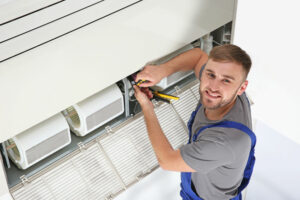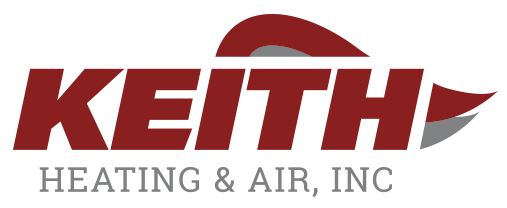 We’re all familiar with the scene– that thin blanket of yellow dust that settles over everything from your porch to your car to even your dog’s fur each time you let him outside. If you live in the southeast you’re likely no stranger to the allergy symptoms that can wreak their special havoc year round in this area. Contact with allergens can cause uncomfortable symptoms like hay fever and congestion, but did you know that your HVAC system maintenance can play a role in allergies and indoor air quality inside your home? HVAC allergies– we’ve got five ways your system could be causing your allergy symptoms.
We’re all familiar with the scene– that thin blanket of yellow dust that settles over everything from your porch to your car to even your dog’s fur each time you let him outside. If you live in the southeast you’re likely no stranger to the allergy symptoms that can wreak their special havoc year round in this area. Contact with allergens can cause uncomfortable symptoms like hay fever and congestion, but did you know that your HVAC system maintenance can play a role in allergies and indoor air quality inside your home? HVAC allergies– we’ve got five ways your system could be causing your allergy symptoms.
Airborne Allergens
Many allergens are airborne, and that means they can quickly and easily travel from outside to inside your home. The most common allergens– pet dander, pollen, and dust– are small enough to move on air currents with ease. As HVAC systems are designed to move air through your home, they can also become a means for these allergens to get circulated around the spaces. When your system is operating as it should, it can help to remove these irritants from the air, but that said a huge influx of allergens or pollen can take a toll on the efficacy of your system. It’s important to make sure pollinating plants are kept away from your outdoor HVAC unit, and that surrounding trees and bushes are kept trimmed back to keep an influx of allergens from becoming an issue.
Accumulation of Allergens
Allergens can also enter your living spaces through your ductwork. If the ducts are not frequently cleaned, dust and other allergens can build up inside them and be circulated throughout your home as the air flows through the duct system. Also, poorly sealed ducts can allow particles of dust and the like to enter into the ducts, exacerbating the problem. For these reasons, it’s really important to ensure your ducts are properly sealed, and regularly maintained. Allergies aside, ducts with build up can also cause your HVAC system to have to work harder than it should, and can even result in higher energy bills due to affected efficiency.
 Proper Air Filtration
Proper Air Filtration
One of the primary functions of your HVAC system is air filtration. Your system relies on filters to remove dust and unwanted debris from the air in your home to ensure it is fit to breathe. As such, it’s important to regularly check and change out these air filters to ensure that your indoor air quality is as healthy as possible, and that your HVAC system is set up for success. If you have family members with asthma, severe allergies, or other lung health issues, you may want to change your filters even more frequently to ensure their ability to perform.
Home Ventilation
Proper ventilation is another area in which your HVAC system should perform. A properly functioning system should heat and cool your home, filter out allergens, and ensure your spaces are well ventilated. Household items such as cleaning products or paints can serve as triggers for allergy symptoms, and your HVAC unit can provide adequate air circulation to mitigate these irritants, and reduce their adverse effects on air quality inside your home.
Maintenance for Prevention
It really all comes down to proper maintenance and preventative care for your HVAC system. When you make it a priority to regularly have your system serviced, it can help prevent the spread of allergens throughout your living spaces. Maintenance will also ensure your HVAC components are running smoothly so you won’t have to risk breakdowns, costly repairs, or other problems that can ensue.
If you think it may be time for an HVAC tune up or professional duct cleaning service, contact our expert team at Keith Heating & Air. We’ll make sure everything is operating as it should, and that your indoor air quality is the best it can be. Don’t wait around and suffer the allergy symptoms, when your HVAC could be helping to minimize their effect.
